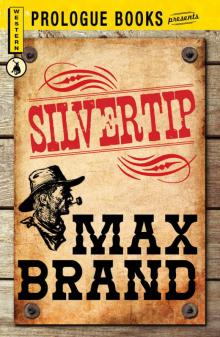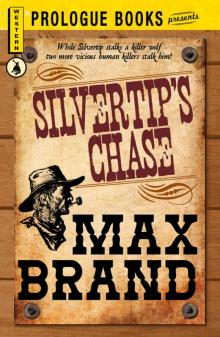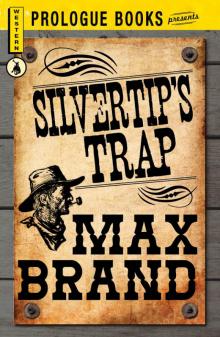- Home
- Brand, Max
Silvertip
Silvertip Read online
A SILVERTIP ADVENTURE
MAX
BRAND
SILVERTIP
a division of F+W Media, Inc.
CONTENTS
Cover
Title Page
Chapter I: Beckoning Lights
Chapter II: The Shot in the Dark
Chapter III: Cross and Snake Brand
Chapter IV: The Haverhill Country
Chapter V: The Silent Men
Chapter VI: The House of Monterey
Chapter VII: Don Arturo
Chapter VIII: Imprisoned
Chapter IX: Señorita Julia
Chapter X: In the Garden
Chapter XI: Brand of Shame
Chapter XII: Drummon’s Men
Chapter XIII: Accepted
Chapter XIV: The Sheriff
Chapter XV: The Drummon Place
Chapter XVI: The Pursuit
Chapter XVII: In the Night
Chapter XVIII: The Torture Job
Chapter XIX: The Second Branding
Chapter XX: Bandini’s Plan
Chapter XXI: Tonio’s Warning
Chapter XXII: Doomed!
Chapter XXIII: Bandini’s Price
Chapter XXIV: The Time to Die
Chapter XXV: The Battle
Chapter XXVI: Geese Across the Moon
Also Available
Copyright
CHAPTER I
Beckoning Lights
“SILVERTIP” was what men called him, since the other names he chose to wear were as shifting as the sands of the desert; but he was more like a great stag than a grizzly. For he was built heavy to the waist; below, he was as slender as any swift-running deer. Yet the nickname was no accident. Above his young face, high up in the hair over his temples, appeared two tufts of gray that at times and in certain lights had the look of small horns. For this reason the Mexicans were apt to call him “El Diablo,” but Americans knew him as Silvertip, which they shortened often to Silver, or Tip.
On this day, he had ridden out of the green of the higher mountains, and now, among the brown foothills, he sat on his mustang and looked over the gray of the arid plains below. The day had hardly stopped flushing the upper peaks with color, but night was already rolling in across the plain beneath. It covered the river; it covered Cruces for a few moments, also, but then the lights of the town began to shine through.
The place glimmered in the thickening welter of shadows, and as Silvertip watched the gleaming, he remembered the little garden restaurant of Antonio Martinelli, down yonder in Cruces. He remembered the taste of the acrid red wine, and the heaping plates of spaghetti, seasoned with Bolognese sauce and powdered with Parmesan cheese.
He knew, then, why he had ridden down through the upper valleys. It was not only because the law did not threaten him, at the moment, but because he was a little tired of venison or mountain grouse roasted over a camp fire. It was dangerous for him to leave the fastnesses and descend into the plains, for even when the law did not want him, there were always sundry men who did. If they could not pull him down single-handed, they would try in numbers. They had tried before, and his body was streaked and spotted with silver where their grip had touched him.
But just as an old grizzly rouses from the winter sleep in the highlands and looks off the brow of some mountain promontory down into the shadows of the plains, remembering the danger of guns and dogs and men, feeling his ancient wounds ache, but recalling also the taste of fat beef and, above all, the delight of the dangerous game — so Silvertip looked down into the shadows and smiled a little. With an unconscious reaction, his right hand went up under his coat to the butt of the six-gun that hung beneath the pit of his left arm, in a clip holster; then Silver started the gelding down into the night.
It was not long before his horse was slipping and stumbling over the water-polished rocks at the bottom of the ford; then the close warmth within the streets of the town received him, the half-sweet, half-pungent odors. The children were still playing, flashing through pale shafts of lamplight and turning dim in the darkness beyond; the house dogs ran with them; only the pigs had gone to sleep.
A sense of comfortable security began to come over Silvertip. He fought against that as a traveler in the arctic struggles against the fatal drowsiness of cold. He sat straighter in the saddle, shrugged back his shoulders, expanded his nostrils to take a deeper breath. As he rode on, his head automatically kept turning a trifle from side to side while his practiced eyes, with side glances, studied the houses at hand and all the street behind him, as well as the way before.
He had to go most of the way through Cruces before he came to the jingling sound of a mandolin and the noise of jolly laughter that told him he was near Antonio Martinelli’s place. It stood off by itself, surrounded by the olive trees and grapevines, which only the pain of Italian handwork could make flourish in the dry West. The two windmills which gave life and greenness to that spot were both whirling their wheels high overhead with a soft, well-oiled clanking.
He did not go directly in, but first rode past the lighted front of the saloon, hotel, and restaurant; for Martinelli’s place was complete. He rode close, piercing the windows with his glance, peering over the top of the swinging doors of the saloon through the smoke wreaths at the faces within. All seemed friendliness and cheer; the dangerous feeling of security welled up in him, again, irresistibly. His taut mind relaxed as a body relaxes, after labor, in a warm bath.
He rode straight back around the building to the stable, and led the mustang inside. The horse drew back, cowering a little. It snorted and stamped; it trembled at the unfamiliarness of inclosing walls, for it was as wild as the mountains among which Silvertip had caught it.
High up on the mow, a voice was singing. Hay rustled and thumped down into a manger.
“Hey, Piero!” called Silvertip.
“Hey? Who’s there?” called the voice of a man from the top of the haymow. Then, as though the tones of Silvertip had gradually soaked deeper into his memory: “Oh, Silver! Is it Silvertip?”
“Yes,” said Silver.
“I am coming — quickly!” panted Piero Martinelli. “Oh, Silver, this is good! Is it safe for you to be here? Are we to hide you? Must I talk softly? How long will you stay? Father will be happy — mother will dance and sing. Ah, Silvertip,” he finished, as he came breathless to the bottom of the ladder and gripped the hand of the larger man, “how happy I am to see you again!”
“I knew your singing, and I knew your song, Piero,” said Silver. “And I don’t have to hide, this time. Look out — this is a wild devil of a horse.”
“I know,” said Piero, laughing. “You don’t like tame things; you like them wild. Oh, we all know about that. I won’t come near those heels. Does it bite and strike?”
“Like a mountain lion,” said Silvertip, stripping the saddle from the round, strong barrel of the horse. “There’s plenty of hay for him. Will you come in with me? Are you through here?”
“Of course I’m through,” said Piero. “The work ends when you come. I’ll tell every one that — ”
“No,” cautioned Silvertip. “Don’t do that. I want a corner table in the garden; to be as quiet as possible; to hear the singing; to eat pounds of spaghetti. You know, Piero, that the day has passed when I could walk into a crowd and be comfortable. It’s bad medicine for me to have any one standing at my back.”
“Ah, ah,” groaned the other. “I know! Well, we’ll go in the side door.”
They walked out into the open, following a curving path covered with gravel. The step of Piero was a loud crunching, but the foot of Silver, in spite of his weight, made hardly a sound.
“Tell me who’s inside,” said Silvertip.
“All good fellows,” answered Piero. “Al
l except one.”
“Never mind about the others, then. Tell me about him.”
“The Mexican, Bandini, he — ”
“You mean José Bandini?”
“Yes, that one — with the record of killing so many men — that same José Bandini.”
“He’s a bad hombre,” remarked Silvertip, pausing. “And there’s an old grudge between us.”
“Hi!” exclaimed Piero under his breath. “Is there an old grudge? And will he face you? Will he really dare to face you, Silver?”
“He’ll face anybody if he has to,” answered Silver. “But he’d rather shoot from behind. Bandini’s there, is he? Well, that’s bad.” He walked on, slowly, saying in addition: “I know him and I know his record. But his killings are mostly talk. Like mine, Piero. You know what they say of me, and it’s mostly talk.”
“Ah — yes?” murmured Piero politely. Then he went on, with a touch of passion: “That Bandini is with another Mexican — a young man — a very fine-looking young Mexican. They are eating together in one of the small rooms. Bandini is making trouble. We hear their voices jump up high, for a minute or two, and then drop away, again. There is a lot of trouble between them. My mother is worried.”
“If Bandini’s talking,” said Silvertip, “you don’t need to worry. That sort of snake doesn’t rattle before it strikes.”
They went in through a side door into a kitchen filled with smoke and whirling wreaths of steam, for all the cooking was done at a great open hearth, with black pots hoisted on cranes in various places above the flames. Two women were working, one slender and young, one overflowing with fat and energy and high spirits. Her rosy face grew redder still when she saw Silvertip. She threw out her arms as though she would embrace him, and then with moist hands, took both of his and struck them softly together.
“Ah, Silver,” she cried, “I speak of you, and you come. But I am always speaking of you, and you are seldom here. Look, Maria! Do you see him? He is bigger than I said, eh? See the gray spots in his hair? See how brown he is, too, and how his eyes laugh. See how he smiles, exactly as I said; mostly with his eyes. Look at him! You’ll never see such a man again, so good and so bad and so gentle and cruel and so much of everything that we love. We have reason to love him; I’ve told you the reason, too.”
The girl began to blush and laugh. Silvertip, with that faint smile of his, picked a handful of smoke out of the air and made as though to throw it into the face of Mrs. Martinelli.
“What do you have, Silver?” she asked him. “Antonio has a bottle of red wine saved for you. It is the last of the old wine, that you liked. It is down in the cellar, covered with dust, old with waiting for you. But what will you eat? Look — here are Spanish beans — yonder is roast kid — here’s roast chicken. Look at the brown of it, Silver! And here — ”
“Spaghetti, that’s what I want,” said Silvertip.
“Spaghetti of course, and then?”
“Spaghetti first, with that meat sauce, and lots of Parmesan cheese to sprinkle on it I can’t think about what I’ll want next until I’ve looked at that spaghetti.”
“You see, Maria?” said Mrs. Martinelli. “I told you that he was true Italian. He will have his pasta. And if — ”
“No!” cried a voice from beyond the wall on the left “No, José!”
That cry struck a silence through the kitchen, and banished all the smiles except that quiet smile of Silvertip which was so often on his face.
“There! There!” whispered Mrs. Martinelli. “You hear, Silver? It’s Bandini. There’s murder in the air. It’s Bandini — and he means to kill, I’m sure.”
“Tush,” said Silver. “He’s talking too much. There’ll be no shooting.”
“Ah,” said Mrs. Martinelli, “you may say that, but I tell you, Silver, that a man’s eyes — even your eye — can only see what it falls on. But I see something more. And there is death in the air to-night. Some one will die before the kind daylight comes back.”
A door opened, with a sudden bang, and José Bandini stood on the kitchen threshold.
CHAPTER II
The Shot in the Dark
EVEN without the force of his reputation, Bandini would have given pause to the eye and the mind of any observer. He was one of those tall men with narrow shoulders and long fingers, who are strong as apes in spite of their slenderness. Of the meager width of his shoulders he was very conscious, and usually wore, as he was doing now, a cloak with a wide-flaring collar. He was dressed like a Mexican cow-puncher on holiday, with a silk shirt and a colorful scarf tied about his hips. But nothing mattered, on second glance, except the face of the man. For it was built back from the chin in a series of steps, all rugged. Chin and mouth, nose, brow, receded in due order, and yet there was plenty of brain capacity in that head. It was a handsome face, in a strange way, time-battered, life-worn; and at will Bandini could be either charmingly pleasant, or savagely dangerous.
He was dangerous now. He thrust forward his head a little and blazed his eyes at Mrs. Martinelli.
“You woodenhead!” he shouted. “Where’s the pepper sauce for those frijoles? And send me a waiter with another face, because if I see the fool again, I’m going to scramble his brains on the floor!”
Suddenly he was silent. He had seen the face of Silvertip, and the faint, small smile on it. The fingers of the right hand of Bandini made a sudden movement which could hardly be followed; it was the sign against the evil eye. The glance of Bandini lifted to the small gray tufts, like incipient horns, high above the temples of Silvertip.
“Señor Silver,” said Bandini, and made an ironic bow. Then he came across the room, deliberately. It was plain that he was afraid, but a devil of the perverse in him forced him on into the danger. He stood right in front of Silvertip, and eye to eye.
“Have you come to see me, señor?” he asked.
Silvertip said nothing. He kept on smiling, and looking. The moment lasted ten grim seconds. Suddenly Bandini turned white, and shouted:
“Have you come here to insult me? You know where to find me! Bandini does not run!”
“I want to talk with you,” said Silver. “Come outside into the dark for a moment, will you?”
Bandini turned yellow-white about the corners of his mouth.
“Only for talking; I want a word with you alone,” said Silver.
“Dark or light and day or night, I avoid no man,” said Bandini, and went out through the door with a swagger that brushed his cloak against both sides of it.
Silver took heed of the round eyes of fear that were fixed upon him from both sides, and he reassured them with a smile. Then he stepped behind Bandini into the darkness, and pulled the door shut behind him.
There was only starlight here, and the stars were dim lanterns by which to follow the movements of a Bandini. Silver became just a trifle more alert than a hunting cat.
“Now!” breathed Bandini. “And what do you want?”
“I want some news,” said Silver. “I want to know about the fellow who’s having dinner with you. I want to know what’s in the air.”
“Just a fool of a boy — that’s all he is,” said Bandini, after a moment. But there was that in his eyes that made Silvertip yearn to see the face. A single glint of light would have helped then, to reveal a story. “And what business is it of yours?”
“It ought to be every man’s business,” said Silvertip, “to watch you. No good ever came out of you, Bandini.”
“Do you insult me?” snarled the Mexican.
“You don’t understand me, Bandini,” said Silvertip. “I don’t insult you. A man doesn’t insult a rattlesnake; he shoots it. And that’s what will happen between us, before the wind-up.”
He heard no answer — only the heavy, irregular breathing of the Mexican. Bandini was afraid — sick with fear — and Silver knew it.
“Every man who has ever seen you at work has reasons enough to wish you dead, Bandini. That’s why I’m asking you what deviltry you
’re up to with that other young Mexican, to-night?”
No matter what fear there was in Bandini, he exclaimed suddenly: “Is every man to tell you his secrets — or be murdered?”
Silver, gritting his teeth slowly together, mused on that answer before he said: “I’ve seen you deal crooked cards; I’ve seen the scar of your knife left on a man’s back; I knew some of the dead men you’ve left behind you. Now you’re at some deviltry again, and you’re not going through with it, if I can help it. I’m going to give you time to think it over. Pull yourself together and make up your mind.
“There’s no reason why we should spoil our dinners about this. But by nine thirty I’ll look for you in front of the restaurant — anywhere on the street in front of it. If you’re there, I’ll know that you want to have it out with me. If you’re not there, I’ll know that you’ve left town. But if you’re neither in the street nor out of town, I’m going to start looking for you, Bandini, and I’ll break down doors until I get at you. It was never intended that rats like you should go about the world gnawing at the lives of honest men!”
There was another moment of pause; he heard, again, the hurried breathing of the Mexican, like that of a man who has been running hard. Then Bandini turned on his heel. His cloak swished with a whispering sound through the air, and he passed back into the kitchen. As Silvertip entered in turn, the farther door banged behind Bandini, and Silver stepped into a strained moment of silence in the kitchen.
Silver turned with a sudden cheerfulness to Piero.
“If there’s a corner table in the garden, I’m going to have it, Piero.”
“Come!” said Piero Martinelli.
“No,” said Silvertip. “Quietly does the trick. I’ll find my way. I’m hungry for that spaghetti, Mrs. Martinelli.”
Then he went out toward the garden. The bustling in the kitchen began again, behind him.
“Wake up!” cried Mrs. Martinelli to the kitchen maid. “Get the pepper sauce for that Bandini devil. Fan that charcoal and bring it to life. Do something! What’s the matter with you?”

 Alcatraz
Alcatraz the Long, Long Trail (1923)
the Long, Long Trail (1923) Silvertip's Roundup
Silvertip's Roundup Mountain Riders
Mountain Riders Silvertip (1942)
Silvertip (1942) Silvertip's Search
Silvertip's Search Silvertip
Silvertip Bull Hunter
Bull Hunter Gunmans Reckoning
Gunmans Reckoning The Seventh Man
The Seventh Man Man From Mustang
Man From Mustang Riders of the Silences
Riders of the Silences Black Jack (1922)
Black Jack (1922) Way of the Lawless
Way of the Lawless Silvertip's Chase
Silvertip's Chase Trailin
Trailin Silvertip's Trap
Silvertip's Trap Ronicky Doone (1921)
Ronicky Doone (1921) The Night Horseman
The Night Horseman the Garden Of Eden (1963)
the Garden Of Eden (1963) Valley of the Vanishing Men
Valley of the Vanishing Men Silvertip's Strike
Silvertip's Strike Black Jack
Black Jack the Untamed (1919)
the Untamed (1919) Way Of the Lawless (1921)
Way Of the Lawless (1921) The Untamed
The Untamed